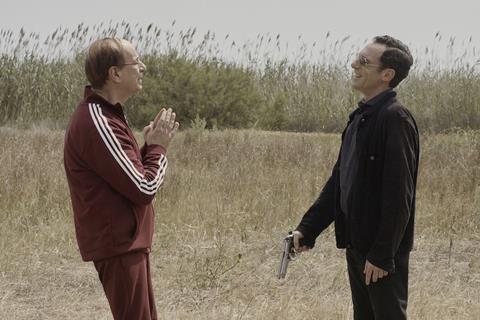An ex-politician goes undercover in this Sicilian mob comedy which fails to hit the target

Dirs/scr: Fabio Grassadonia, Antonio Piazza. Italy/France. 2024. 131mins
Recently released from a six-year stint in prison, Catello (Toni Servillo) has lost his political career (he’s a former mayor), investments and his wife’s respect. She would prefer him to die from a heart attack than a stroke, but isn’t bothered either way. So when the Secret Service approaches him to collaborate in an operation to capture a mafia boss – his godson Matteo (Elio Germano) – Catello has little choice but to accept, entering into correspondence with Matteo through “pizzini” (a covert Mafia mail system). This high-stakes intellectual dance between two untrustworthy men is an intriguing premise, but the third feature from directing duo Fabio Grassadonia and Antonio Piazza is too flabby to work as a thriller, and too laboured to connect as a comedy.
The main issue with the film is that there is simply far too much of it
The fingerprints of organised crime are evident on all of Grassadonia and Piazza’s films to date. Their debut, Salvo, which won the Critics’ Week Grand Prize in Cannes 2013, followed a Mafia hitman; their second feature, Sicilian Ghost Story (which won a screenplay prize at Sundance) was inspired by the real life gang-related abduction of a child. Like Sicilian Ghost Story, Sicilian Lessons was loosely inspired by real events – although we are cautioned at the outset with the statement that “reality is a point of departure, not a destination.” More comic in tone than the previous two pictures, this represents a change of direction for the pair. But it’s a humour that leans on Servillo delivering pages of floridly ornate dialogue, so it might work best for Italian-speaking audiences.
The main selling point for the film, both domestically and elsewhere, is likely to be Servillo, who is impressive as this slippery, slightly ridiculous but sharp-witted man. Servillo’s theatre actor’s gravitas allows us to look past the staginess of some of the dialogue; his expressive, sad basset hound face is consistently the most fascinating thing on screen. Meanwhile, Germano is authentically dangerous as the big shot in hiding: a ruler of men whose kingdom has been reduced to doing jigsaws and glowering behind the closed doors of his safe house.
Matteo’s back story is explored through a series of structurally inelegant and sometimes disorientating flashbacks, incorporated using slightly surreal flourishes that feel at odds with the flat and functional look of the rest of the film. We first see him as a child, the youngest son of his beloved mafia boss father. Eager to prove himself, the young Matteo steps up to slaughter a sheep, something that his more squeamish older brother refuses to do. Covered in sheep’s blood and glory, Matteo is chosen as his father’s successor in the family business.
Fast forward to the time in which the film is set – the early 2000s – and Matteo is grieving the death of his father, something that makes him vulnerable to the syrupy sentiment in Catello’s letters. And Catello juggles his relationship with his new penpal with his dealings with the police, one of whom, it becomes clear, is a mafia informant.
The main issue with the film is that there is simply far too much of it. Some scenes drag on far longer than is necessary – like Castello’s verbose letter writing, it never quite manages to get to the point. Other scenes seem entirely redundant, serving to slow the pace of the storytelling and little else. The filmmakers inject some energy with a droll musical score to signpost the moments of comedy but, even so, this is more arduous than humorous for much of the time.
Production company: Indigo Film, Rai Cinema, Les Films du Losange
International sales: Les Films du Losange r.quinet@filmsdulosange.fr
Producers: Nicola Giuliano, Francesca Cima, Carlotta Calori, Viola Prestieri, Alexis Dantec
Cinematography: Luca Bigazzi
Editing: Paolo Freddi
Production design: Gaspare De Pascali
Music: Colapesce
Main cast: Toni Servillo, Elio Germano, Daniela Marra, Barbora Bobulova, Giuseppe Tantillo, Fausto Russo Alesi, Antonia Truppo, Tommaso Ragno, Betti Pedrazzi, Filippo Luna, Rosario Palazzolo















![[L-R]: Amanda Villavieja, Laia Casanovas, Yasmina Praderas](https://d1nslcd7m2225b.cloudfront.net/Pictures/274x183/6/4/1/1471641_pxl_20251224_103354743_618426_crop.jpg)


